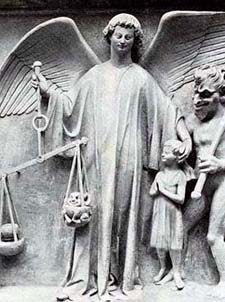"St. Francis before the Sultan," Fra Angelico
Today we celebrate the feast of St. Francis of Assisi (1182 AD - 1226 AD). The indulged son of a wealthy cloth merchant, Francis lived a merry youth as the leading gallant of Assisi until he was taken prisoner in a petty war against Perugia. During this year long captivity, Francis was led to a reconsideration of his previous frolicsome, but empty, life, and took the first serious steps towards the devotion to Lady Poverty which would become a hallmark of Francis's later life.
The following is taken from "The Little Flowers of St. Francis" compiled by an anonymous author a century and a half after St. Francis's death.
St
Francis, urged by zeal for the faith of Christ and by a wish to suffer
martyrdom, took with him one day twelve of his most holy brethren, and went
beyond the sea with the intention of going straight to the Sultan of Babylon.
They arrived in a province belonging to the Saracens, where all the passes were
guarded by men so cruel, that no Christian who passed that way could escape
being put to death. Now it pleased God that St Francis and his companions
should not meet with the same fate; but they were taken prisoners, and after
being bound and ill-treated, were led before the Sultan. Then St Francis
standing before him, inspired by the Holy Spirit, preached most divinely the
faith of Christ; and to prove the truth of what he said, professed himself
ready to enter into the fire. Now the Sultan began to feel a great devotion
towards him, both because of the constancy of his faith, and because he
despised the things of this world (for he had refused to accept any of the
presents which he had offered to him), and also because of his ardent wish to
suffer martyrdom. From that moment he listened to him willingly, and begged him
to come back often, giving both him and his companions leave to preach
wheresoever they pleased; he likewise gave them a token of his protection,
which would preserve them from all molestation.
At
length St Francis, seeing he could do no more good in those parts, was warned
by God to return with his brethren to the land of the faithful. Having
assembled his companions, they went together to the Sultan to take leave of
him. The Sultan said to him: “Brother Francis, most willingly would I be
converted to the faith of Christ; but I fear to do so now, for if the people
knew it, they would kill both me and thee and all thy companions. As thou
mayest still do much good, and I have certain affairs of great importance to
conclude, I will not at present be the cause of thy death and of mine. But teach
me how I can be saved, and I am ready to do as thou shalt order.” On this St
Francis made answer: “My lord, I will take leave of thee for the present; but
after I have returned to my own country, when I shall be dead and gone to
heaven, by the grace of God, I will send thee two of my friars, who will
administer to thee the holy baptism of Christ, and thou shalt be saved, as the
Lord Jesus has revealed to me; and thou in the meantime shalt free thyself from
every hindrance, so that, when the grace of God arrives, thou mayest be found
well disposed to faith and devotion.” The Sultan promised so to do; and did as
he had promised. Then St Francis returned with his company of venerable and
saintly brethren, and after a few years ending his mortal life, he gave up his
soul to God. The Sultan, having fallen ill, awaited the fulfillment of the
promise of St Francis, and placed guards in all the passes, ordering them if
they met two brothers in the habit of St Francis to conduct them immediately to
him. At the same time St Francis appeared to two of his friars, and ordered
them without delay to go to the Sultan and save his soul, according to the
promise he had made him. The two set out, and having crossed the sea, were
conducted to the Sultan by the guards he had sent out to meet them. The Sultan,
when he saw them arrive, rejoiced greatly, and exclaimed: “Now I know of a
truth that God has sent his servants to save my soul, according to the promise
which St Francis made me through divine revelation.” Having received the faith
of Christ and holy baptism from the said friars, he was regenerated in the Lord
Jesus Christ; and having died of his disease, his soul was saved, through the
merits and prayers of St Francis.
St. Francis of Assisi, pray for us.





